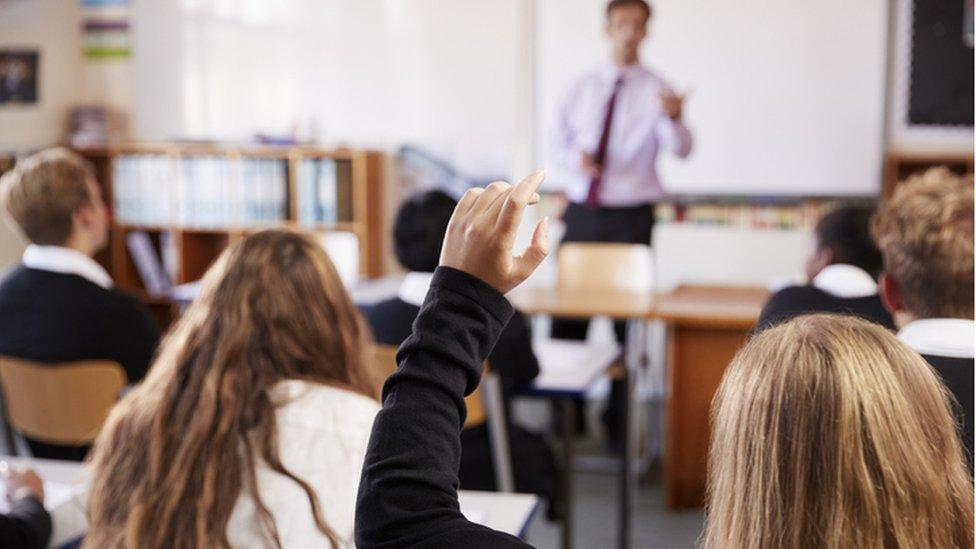Sexual consent teaching in NI schools 'not good enough'
- Published

It is "not good enough" that almost half of schools in Northern Ireland teach little or nothing about sexual consent, an Education and Training Inspectorate (ETI) report has said.
It suggested the vast majority taught little or nothing about LGBT issues, sexual orientation or gender identity.
The report was based on responses from more than 14,500 primary and post-primary pupils and 500 schools.
It included visits by inspectors to 50 schools.
The ETI inspectors said there was a lack of lessons on topics such as consent, domestic abuse, gender, transgender issues, contraception, pregnancy and abortion and menstrual health and wellbeing.
One pupil told the inspectors that "sexuality education has never been discussed other than in religious studies" in their school.
Another said that relationships and sex education (RSE) in their school was "only for heterosexuals".
'Inconsistent experiences'
Many post-primary pupils also told the ETI that "teachers regularly skip teaching certain sensitive subjects".
Each school in Northern Ireland is required by the Department of Education to teach RSE to pupils.
However, what is actually taught about RSE is a matter for each school to decide based on their school ethos.
That approach has previously been criticised by some experts who have said it leads to "different and inconsistent learning experiences" for pupils.
Retired judge Sir John Gillen has also recommended that age-appropriate relationship and sex education should be taught to schoolchildren from primary one.
Sir John has also recommended more lessons on topics like respect and consent.
The ETI inspected how the "preventative curriculum" - which includes things like RSE, emotional wellbeing and relationships - is being taught in Northern Ireland's schools.
Its report - based on questionnaire responses from pupils and schools - found a large number of areas for improvement.

Only two-thirds of pupils said that people who had different sexual orientations would be welcome in their school
A majority of schools reported that over the past two years their main safeguarding concern was in their pupils' mental health.
"A significant number of pupils exhibit difficulties with anxiety, social interaction, concentration and attachment, and schools/centres report that they encounter lengthy delays in accessing appropriate external support for those pupils who need it," the ETI said.
Sensitive issues
Schools highlighted rising waiting lists for Children and Adolescence Mental Health Services (CAMHS) in particular.
They also said they were dealing with "a growing number of online bullying and digital safeguarding incidents, such as sexting and sharing related images".
But despite pupils saying that they wanted to know more about "sensitive issues" like gender identity and sexual orientation, more than 80% of schools provided little or no teaching on those topics.
Only two-thirds of pupils said that people who had different sexual orientations would be welcome in their school.
"Teach different types of sex education as it wasn't taught correctly and only for heterosexuals," one pupil is quoted as telling the inspectors.
"We have not been taught acceptance of sexualities in this school and there are quite a lot of homophobic pupils as a result of this," another said.
"Clearly, there is a disconnect between the topics that pupils want to learn about and the reality of the curriculum which they experience," the ETI report said.
Also despite Sir John Gillen's recommendations only just over half of schools taught pupils about consent in any detail.
"It is not good enough for pupils that 44% of all schools/centres report that they are delivering the topic of consent to a small extent or not at all," the ETI report said.
"This aspect of the curriculum is too important for the potential wellbeing of pupils to be either omitted or skimmed over."
"You wonder why rape and sexual assault is such an issue but do nothing to teach morals around the topic," one pupil told the inspectors.
Worries over objections from parents
Many schools also avoided teaching pupils in any detail about sexual exploitation, domestic abuse or sexual abuse.
But three-quarters of staff said they lacked the confidence to teach "sensitive topics" and a similar amount said they received little or no training to do so.
Some said they also feared objections from parents.
As a result, many schools brought in external organisations to teach about things like consent, periods and contraception.
"The evidence is clear that there is selectivity and potential avoidance of the areas taught within the preventative curriculum," the ETI report concluded.
"There is a risk, that some pupils in NI could leave school without a clear, unbiased knowledge and understanding of important concepts such as consent, healthy relationships, and gender identity."
But while the ETI said that its report highlighted key findings that "need to be addressed, as a matter of urgency," it did not recommend a "prescribed" or mandatory curriculum for schools.
"It is important that school/centre-based autonomy and flexibility to respond to contemporary issues is not lost by a purely legislative and prescriptive approach, which in itself does not guarantee high quality teaching, learning and provision," the ETI said.
Related topics
- Published13 March 2021
